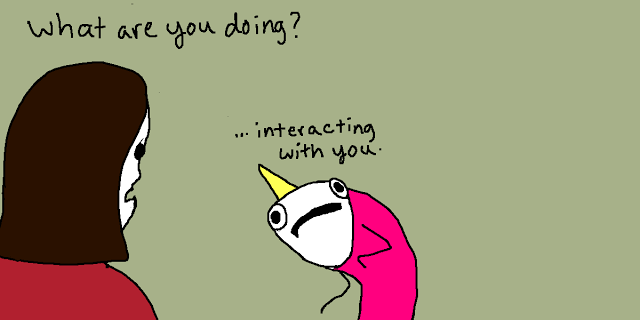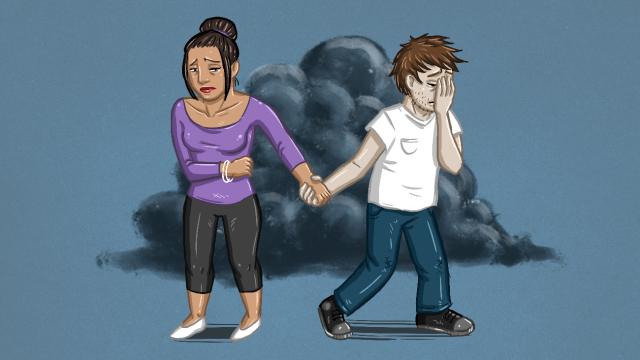Being in a romantic relationship when one (or both) of you suffer from depression is a massive challenge. Depression can make your partner seem distant. They may feel like they’re a burden or close themselves off. None of that means your relationship is the problem. You two can tackle this together. Here’s how.
Pictures: Hyperbole and a Half, Antoine K
As I’ve discussed before, I struggled with depression for years. That didn’t stop me from trying to have relationships, but it affected each one differently. It’s important to keep in mind that how depression manifests will vary not only from person to person, but relationship to relationship. We can give you some tips and suggestions, but only you and your partner can decide your boundaries, your compromises, and what you can handle.
The good news is, it’s not hopeless. A depressed partner can cause stress in a relationship. So can a death in the family, money troubles, or disagreeing about whether Firefly is good or not. Depression isn’t the first problem couples have had, and it won’t be the last. Just like any other problem, you can seek therapy together and work through your problems. Here are some of the ways to do just that.
Don’t Take the Symptoms of Depression Personally

One of the key symptoms of depression is a naturally skewed sense of reality. Everything feels worse than it is, and some days it can be overwhelming just to drag yourself out of bed in the morning. When someone who is depressed is in a relationship, that lethargy can carry over into things like going on dates, having sex, or even carrying on basic conversations. If your partner seems to have lost interest in these essential elements of a relationship, it can hurt. It’s also very likely that the reason they’re not interested in those things has absolutely nothing to do with you.
Part of the problem is that most of the symptoms of depression directly contradict the characteristics of healthy, successful relationships. If your relationship is good, you both should be positive! You should be trying new things! You should have active social lives with other people! You should have sex regularly! There are very few relationship guides out there that say a successful relationship is one where your partner comes home from work, says very little, watches Netflix for four hours, then falls asleep for the next 10. What other couples see as warning signs are your normal routine.
Those things may be warning signs, but they’re not necessarily about you. If you had a partner who had a broken leg, they may not be able to go out on as many dates or have as much sex, but you can clearly see why. With depression, the problem is hidden. It’s easier to assume that you’re the cause because there’s nothing obvious to point your finger at. As lifestyle blog Literally, Darling explains, this only gets worse when you see your depressed partner act differently around other people, but that’s not a bad thing:
It’s hard not to take things personally. It’s even harder to not wonder if you did something to make your loved one depressed. When you’re depressed, you feel this complete and utter inability to be yourself, and it makes it ten times harder when you’re around loved ones; ie. people who know the real “you.” Being with strangers can sometimes be easier for them: they get to put on a show. They get to pretend that they aren’t depressed for a short amount of time. It can really hurt you to see this, and you sometimes wonder if it’s just you causing the depression. But it’s not. If your loved one is acting depressed around you, it’s a good sign- in a strange way. It means that they love and trust you enough to share this with you. Sometimes they try to hide it- sometimes they will push you away. The only thing to do is just be there.
Even in a healthy relationship, you can’t make someone else’s emotional well-being your sole responsibility. Depression can tank your partner’s sex drive, make them seem bored with the things you talk about, or take the joy out of things they might otherwise enjoy. Those are certainly problems that need to be dealt with. However, it’s also important to understand that having depression and being unhappy with your relationship are two separate issues. As long as your partner says that you’re not the reason they appear unhappy, take them at their word and try to work on the other issues together.
Develop a Plan to Tackle Depression Together
You should avoid taking your partner’s symptoms of depression personally, but you shouldn’t ignore them. The fact that depression can sap your partner’s motivation for romance doesn’t make it hurt any less when you feel neglected. If your partner were sick or injured, you wouldn’t resent them for it, but you would help them get treatment. Depression is no different.
Supportive, loving relationships can actually be a huge benefit to someone suffering from depression. However, that only works if you’re both working together to deal with it constructively. That includes being understanding of your partner, but it also means taking practical steps to deal with the underlying issue. The Anxiety and Depression Association of America suggests a variety of ways to do this (educating yourself about depression, encouraging them to stick to goals, tracking progress), but one of the best ways to help is to go to therapy together:
Mental health professionals are increasingly recommending couple- and family-based treatment programs. In one approach, a mental health professional enlists the partner as a co-therapist. With training, the partner can assist the patient with homework assigned by the therapist. This might involve accompanying the patient into anxiety-producing situations and providing encouragement to stay in the situation by using anxiety-reduction techniques.
Even if you don’t go to therapy together (or at all), finding a therapist together and helping out in your partner’s treatment can make a world of difference. Set timelines and goals for yourself so you know what you’re working towards. There may not be a definitive “end point” to treatment, but ideally you’ll work towards a sustainable solution that both of you can handle.
It’s also important in this phase not to force treatment on your partner. You can assist and support, but you can’t coerce your partner to do anything. If they refuse to get help, then you’re welcome to reassess whether or not you can remain supportive or stay in the relationship, but they need to decide for themselves how and when to get help.
Give Your Partner Space to Have Bad Days

Here’s the thing about getting treatment for depression: it’s messy. Like, “teaching a cat to fingerpaint” messy. You can have all the plans and journals and goals in place and adhere to them perfectly. Still, when you’re suffering from depression, some days you’re going to wake up, feel hopeless, berate yourself for feeling hopeless, cite the fact that you still feel hopeless after all your hard work as proof that it is hopeless, curl up into a ball, and stay there until you fall asleep. These things happen.
Of course, if you’re dating someone who’s dealing with depression, you don’t see that internal dialogue. All you see is someone who’s sitting on the couch, spending all day in bed, or not answering your texts. It’s tempting at that point to push them to get “back on track”, or get frustrated that they’re “relapsing.” That’s fine in general, but it’s also important to recognise that bad days are going to happen. A single bad day doesn’t mean the end of the world. In fact,
As author and psychotherapist Dr. Rita DeMaria explains, your love and support is helpful, but it’s not a cure:
Your spouse needs your love, support, and concern. But these important qualities can’t reverse depression any more than they can control blood sugar, ease arthritis pain, or clear out clogged arteries. Just as you wouldn’t rely on love alone to cure a medical condition — or withdraw love because it didn’t — don’t expect that your feelings or attention will be able to alter your spouse’s off-kilter brain chemistry. Use your love to get help and to remind your partner of his or her intrinsic worth during this challenging time.
Speaking from personal experience both as a depression sufferer and as someone who’s played the supportive role for a significant other, this is as critical as it is difficult. The nature of depression is that it overrides the normal, expected function of your emotions. Happy things don’t make you happy, exciting things don’t make you excited. That’s the problem. However, having someone there to accept you when you feel bad (or feel nothing), without condemning you for something you both expected to happen, can mean the difference between recovery and slipping back into old habits.
Identify What You Each Can Handle and Stick To It
Supporting a significant other through a hard time is always going to be stressful. There’s no getting around that. That doesn’t mean it’s not worth it, but it can be a danger to your own well-being. You can’t help your partner if you’re too overwhelmed to function. It’s romantic to think we’ll “do whatever it takes” to help the people we love, but that mindset can bring your own mental health crashing down around you. When you’re helping your partner, be sure to give yourself some clear boundaries on what you can and cannot offer.
That doesn’t just mean having an idea of how much you can take before you break up (although it can). More constructively, you should identify what you need to be happy, healthy, and able to continue supporting both yourself and your partner. This might include carving out time for your own hobbies, making time to be alone, or socialising with other people. As non-profit mental health organisation Help Guide suggests, this also includes refusing to be your partner’s therapist:
Set boundaries. Of course you want to help, but you can only do so much. Your own health will suffer if you let your life be controlled by your loved one’s depression. You can’t be a caretaker round the clock without paying a psychological price. To avoid burnout and resentment, set clear limits on what you are willing and able to do. You are not your loved one’s therapist, so don’t take on that responsibility.
You can help remind your partner to take medicine or write in a journal, but that doesn’t make it your responsibility. You can encourage them to go to therapy, but they also need to be able to take themselves at some point. This isn’t something you need to enforce because you want to be callous or cruel, but rather because if you’re on the hook for their entire recovery, you’ll burn out and then you’ll both be miserable. You can be a loving partner, but if you’re not supporting each other equally (or at least something approaching equal), it can breed resentment.
This also includes letting your partner know when you’re unhappy. When your partner is depressed, it’s very easy to be afraid to mention when something’s on your mind. Emotions are already volatile, but if you’re afraid that telling your partner “You let me down” or bringing up something that makes you angry or sad will trigger a depressed episode, you might be more likely to bottle up your own issues. While it might help to let some smaller things go, you also need to be able to speak up when you’re unhappy about a continued pattern.
If depression is affecting you or someone you know, call Lifeline on 13 11 14.

Comments
6 responses to “How To Support A Partner Struggling With Depression”
I had a partner who suffered depression. What I got was constant criticism in everything. The relationship folded eventually, I don’t know if the criticism was part of the depression or real problems on my part. Or if she was just looking for a way out.
She saw a therapist every week. Depression can complicate things
Only if you are a complete and utter … . I think not though given you have considered your possible contribution. It is very hard for family members etc to help someone who is suffering from conditions like depression, family members are naturally used to lean on for help and are often ill-equipped to do that for a whole heap of reasons. After tiring of self-criticism you and other family members are often next in line.
I was told there was a thing called reflection where introspection is transferred to a close person. I may not have fully described it
There is nothing worse, then going through hell of depression. You wake up each day, not knowing if you will make it
’till night, or you will simply give in, and end it all yourself. The drugs sometimes help, and sometimes make it worse.
Felt like I had no control whatsoever over my own life. It took me a while, but I managed to teach myself how to push trough the day, and keep on fighting.
In the end, it all comes down to helping yourself get up and fight.
This is such a terrifying topic. We went through so much in life together and have supported each other through some truly rough moments in our lives… but the one thing that broke us was not the depression, it was what appears to be the mania that came after it ( I will never know as I didn’t know the symptoms until too late and by then they had cut me out). After trying to protect what was left of our finances (our whole entire savings were wiped out on spending sprees that they didn’t want me to talk about with them) and trying to seek help for us both, my partner saw this as a betrayal of our trust and severed all ties ( we were together for more than a decade). We are now talking to lawyers to separate our finances and I still don’t understand what is going on, everything I did was from love and concern and they see a completely different viewpoint.
It is truly heartbreaking.
Depression is a DAILY struggle; it takes hard work to overcome it but there is hope. For anyone suffering from depression, I recommend the http://destroydepression.com/info.html system. Written by James Gordon, a former depression & PTSD sufferer, it teaches 7 natural steps which he used to cure his own depression and has helped thousands.